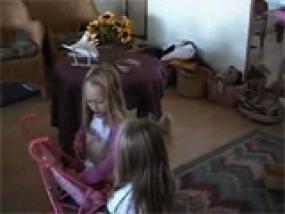Sick Baby

Pretend play encourages young children to try out different social roles (e.g., daddy, wife, teacher), increase their understanding of social contexts (e.g., family, party, school), explore relationships of authority (e.g., mommy & baby), and experience a sense of control by resolving problems (e.g., doctor makes sick patients well).
In this Thinkprint Emma, Brenna, and Julia, three four-year-old girls, are busy caring for a baby with a “boo-boo.” Watch how Brenna (white t-shirt) animates the Mom (mermaid Barbie doll) who feeds the baby. Off camera, we hear Julia pretending to talk on the telephone. Listen as she says, “Hi. (Pause) Hello. Would you pick up our baby? It’s sick. (Pause) Okay, bye.” Notice how Julia cleverly inserts pauses into her pretend telephone conversation to represent the person on the other end with whom she is speaking. Notice how Julia shows that she has shifted from talking on the telephone to talking to Emma and Brenna. Listen as Julia projects her voice and uses a continuous flow of speech to announce to her friends, “The policeman’s coming.”
Watch how Emma invents a way to offer her friend some practical assistance while maintaining the pretend story narrative. Emma realizes Brenna is having difficulty animating the Mom (mermaid Barbie doll) to feed the baby with a fork. Rather than talk directly to Brenna, Emma addresses the character by saying, “I wanna hold it (bowl) for you, Mom.” Note how Julia incorporates her real world knowledge that a policeman does not simply appear at your home immediately, into their pretend plot. Julia (enters the screen shot) walks over to her friends and explains, “He (the policeman) said he’s coming in a few minutes.” Then notice how Emma skillfully advances the plot by signaling that the doorbell is ringing (Ding-dong).
Throughout this Thinkprint, we witness how the children explore their conceptions about friendship, illness, treatment, doctors, policemen, mommies, and telephone conversations as they attempt to care for a baby with a “boo-boo.” In reading the children’s "likely thoughts” we hope you gain an appreciation for the benefits of dramatic play and how it offers us a window into children’s social and emotional development.
Keywords: Fours, Dolls, Child-Child, Pretense, Illness, Rules, Thinkprint
Length of Thinkprint: 22 paragraphs, 17 video subclips
Length of stand alone master video clip: 5 minutes 35 seconds
